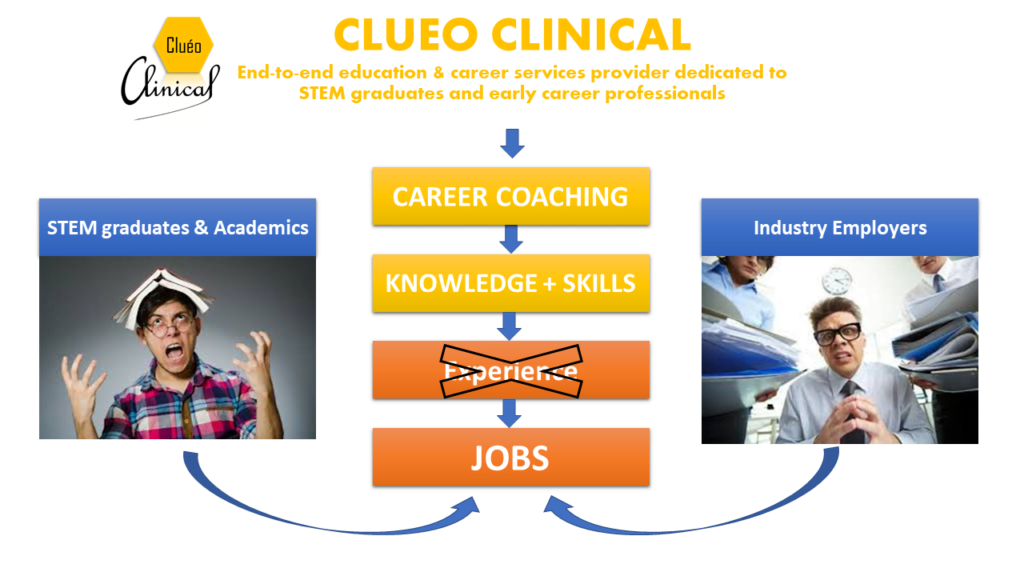Your cart is currently empty!

“I want to get into the clinical research industry, but I don’t know how to get in or even where to start. I also don’t have any prior industry experience. What can I do to break into this industry?”
These are the most frequently asked questions I get from STEM graduates and academic researchers wanting to transition to the clinical research industry.
What is clinical research?

First, let me define ‘clinical research’ so that we are all on the same page, as I find that people outside of the industry are often confused what is involved in this industry.
Clinical research is the branch of healthcare science that determines the safety and effectiveness of drugs, medical devices and other therapeutic interventions or diagnostic products intended for human use. Their use could be for prevention, treatment or diagnosis of a disease or condition.
It is important to differentiate clinical research from clinical practice. In clinical practice, only approved treatments and therapeutic products are used, whereas in clinical research, evidence is collected to establish if a therapeutic intervention is appropriate and safe for patients.
Therefore, the clinical research industry encompasses all stages in the drug development pipeline. This pipeline has 5 stages: 1) research and discovery, 2) pre-clinical research, 3) clinical trials, 4) regulatory approval and 5) post-market safety monitoring of approved products. Each of these stages is a series of complex processes that all work together to ensure only the most effective and the safest therapeutic product will end up on the market for the patients. You can learn about these stages and more essential knowledge including the various stakeholders in this industry in our Clinical Research Essentials course.
The most important and probably one of the longest stages in ‘clinical research’ is ‘clinical trial’. This is because clinical trials mark the start of the “translation from bench-to-bedside”. Hence, the term “first-in-humans” is sometimes used to describe the first phase in clinical trials – Phase I.
The global clinical trials market

Now, that we are somewhat on the same page with our understanding of the clinical research industry. Let’s look at the global clinical trials market and why it is so highly sought after as an industry.
In 2019, the global clinical trials market size was estimated at USD 46.8 billion. This industry is expected to grow by 5.1% every year from 2020 to 2027.
The primary forces behind this industry growth projection include:
- Aging global populations
- Chronic disease becoming more prevalent due to aging populations
- Pandemics like COVID-19 bringing greater awareness of the importance of clinical research and the resulting increase in demand for clinical trials especially in developing countries
- Rise in demand for personalized medicines and orphan drugs
- Technological evolution means more discoveries of drug targets
- Harmonization of clinical trials globally
What all of these translate to is a dynamic working environment, exponential job growth for this sector and rapid career advancements.
It is no surprise that clinical research especially clinical trial is one of the most highly sought-after industries amongst STEM graduates and academic researchers.
How to break-into the clinical research industry without prior experience?
I want to state it up front that it is not easy. However, I can tell you with certainty that IT IS POSSIBLE for you to break-into this industry with zero experience.
How can I say it with such certainty? Because I did it … many years ago. And so, can you.
Let’s face it. We’ve all been there. Graduating from university with high hopes of changing the world or working in our dream jobs. Perhaps, you simply want to change career direction at some points in your life for whatever reasons.
But every job vacancy you looked at; the word “experience” would make you think twice or occasionally would discourage you from moving forward with that dream job.
Even if you manage to get to the interview stage with an impressive CV that you worked tirelessly for days to perfect, and the interview that you worked so hard for, you still don’t get any job offers.
Now, with the global pandemic and financial crisis, there will even more candidates for every job application. Does that mean you might have even less chance of getting in now?
It is important for you to understand that you can have the right “knowledge” and “skills” for the job WITHOUT having worked previously in the same role or even same industry.
After months or sometimes years of failed attempts, you become increasingly disappointed, frustrated, and starting to doubt your own values and worth. But you ask yourself: “I have the right qualifications. Why can’t I succeed? Where did I go wrong? What is missing here?”.
The answers are simpler than you think.
After 15 years working in this industry at various ranks from entry levels to managerial positions, I have collected a wealth of knowledge and experience about the industry that I will share with you here to help you on your journey.
The 2 main criteria industry employers are looking for in any candidate are:
- Do they know what the job is about?
- Can they do it well?
So, when a job description requires ‘experience’, it simply means that the employer wants a candidate with the right “knowledge’’ and “skills” for the job.
It is important for you to understand that you can have the right “knowledge” and “skills” for the job WITHOUT having worked previously in the same role or even same industry.
The next important question is “What are the right knowledge and skills for the job you’re applying for?”.
This is where it is not so simple or straight forward.
Regardless of the industry role you are applying for, below are some tips I would recommend to boost your chance of success:
- Critically assess all the job descriptions and requirements for “key words” that could point you to what the job entails.
- List these ‘key words’ in a table. On the left column is the job description and/or criteria. On the right, describe your current knowledge and/or skills that could address those criteria.
- If there are any “gaps”, mandatory or specific “industry knowledge areas” that you don’t understand or yet have, such as international Good Clinical Practice (ICH-GCP), which is a prerequisite for the clinical research industry. I highly recommend you fill these gaps with relevant trainings before applying. This is because without this mandatory training, the chance of your application being considered for an interview is very slim. Check out our ICH-GCP short course and other clinical research short courses HERE.
- Next, create an appealing industry CV and cover letter. This is the first time that hiring managers and recruiters will know about you, so it is extremely important you put your best foot forward and make that first impression count. If you have no idea what an “industry CV and cover letter” look like or where to start, search online or ask someone (preferably in the industry) you know who can help you. Alternatively, click HERE to get expert help with writing industry CVs and cover letters.
- Before you are invited for an interview, I highly recommend that you start your interview preparation without delay. I will cover how you can prepare for your interview in a separate article.
- Once you’ve successfully passed the screening stage of the job application (including the ATS or Applicant Tracking Tools of recruiters) and receive the long-awaited interview invitation, now you can tailor your industry interview preparation to that specific role.
- The interview day has finally arrived. Are you ready? Do you know what they are going ask and how you can answer those tricky questions about experience? It is true that industry interviews are completely different to other job interviews from academia or the casual jobs you’ve had during university or school. Industry interviews often employ scenario-based questions and behavioral questions. To respond, I recommend you use the STAR (Situation, Task, Achievement and Results) or CAR (Challenge, Achievement, Results) interview techniques.
One way to prepare for your actual performance is to conduct mock interviews with your friends or family before the day to receive feedback on your performance during the interview. For techniques on how to conduct a powerful “virtual interview”, click HERE.
Needless to say that how you perform at an industry interview can make or break your career transition. The better you can “sell yourself and demonstrate your values” to the company without the required “industry experience”, the higher your chance of success will be. Use those ‘key words’ wherever possible in your responses to demonstrate your knowledge of the job and what the employer is seeking from a candidate. If you haven’t got a clue of where to begin, don’t worry, we can help. Click HERE to master industry interviews (with no prior industry experience).
Easy? Not really!?
As I mentioned before, it is not easy. It is entirely possible to break-into the clinical research industry without prior industry experience. You just need:
- The right knowledge and
- The right skills
More importantly, you’ll need to have the right attitude and determination to commit to your own career success.
Where to go for help?

But what if “I don’t know enough (or anything at all) about the industry and I don’t know where to go to get the appropriate knowledge and for help with job preparation”.
I hear you. In fact, I’ve been asked this same question from university students, academic colleagues, friends of colleagues, random people who aspire to enter this industry but without the relevant experience.
At Clueo Clinical, we are passionate about building up people to be the best that they can be. So, we dare to go where no other institutions dare to go. Through our exclusive signature Industry-Bridging Program, “your transition to industry is guaranteed.”
After 2 years of investigation, I realized that there isn’t anything on the market that adequately addresses all the critical gaps and provides the support STEM graduates and young academics need to transition into the industry, I decided to do something to end this inequality.
That was how Clueo Clinical – and end-to-end education and service provider dedicated to STEM graduates and early career professionals – was formed.
At Clueo Clinical, we are passionate about building up people to be the best that they can be. So, we dare to go where no other institutions dare to go. Through our exclusive signature Industry-Bridging Program, “we will guarantee your industry-transition success.”

Dr. Thu (Sue) Nguyen, PhD
Sue is the founder and managing director of Clueo Clinical Pty Ltd. She has 15 years of combined experience in clinical and pre-clinical research and development, training and management. She is passionate about patient-centric science, clinical research, education, and helping others find their career passion and succeed in life.
She is an avid learner, an authentic networker and wants to empower the next generation to reach their fullest potential in Australia and around the world.





